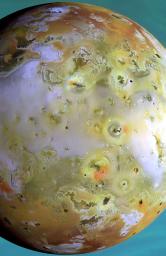
|
Close-up color view of Io
- Click the image above for a larger view
- Full-Res JPEG (581 x 900) (78.6 kB)
- Full-Res TIFF (581 x 900) (1.8 MB)
Caption:
This is the highest resolution color picture taken so far of Jupiter s volcanic moon Io by NASA s Galileo spacecraft. At 3 kilometers (about 2 miles) per picture element, the fiery satellite is seen against a backdrop of Jupiter's cloud tops, which appear blue in this false-color composite. Among the surprises seen on the moon s surface are several small, distinctly greenish patches and subtle violet hues at the cores and margins of bright sulfur dioxide-rich regions (like the one in the lower right). Dark spots, many flagged by bright red pyroclastic deposits, (deposits from explosive ejecta), mark the sites of current volcanic activity. Most of Io's riotous color is due to the presence of sulfur compounds, but the dark materials that make up the flows and calderas are probably silicate rock.
North is to the top of the picture. The images used to construct this composite were taken in the 1- micron, green and violet filters of the solid state imaging camera system on NASA's Galileo spacecraft. The images were taken on March 29, 1998 at a range of 294,000 kilometers (about 183,000 miles).
Background Info:
The Jet Propulsion Laboratory, Pasadena, CA manages the Galileo mission for NASA's Office of Space Science, Washington, DC.
This image and other images and data received from Galileo are posted on the World Wide Web, on the Galileo mission home page at URL http://solarsystem.nasa.gov/galileo/ . Background information and educational context for the images can be found at http://www.jpl.nasa.gov/galileo/sepo .
Cataloging Keywords:
| Name | Value | Additional Values |
|---|---|---|
| Target | Io | Jupiter |
| System | Jupiter | |
| Target Type | Satellite | Planet |
| Mission | Galileo | |
| Instrument Host | Galileo Orbiter | |
| Host Type | Orbiter | |
| Instrument | Solid-State Imaging (SSI) | |
| Detector | ||
| Extra Keywords | Atmosphere, Color, Storm, Volcano | |
| Acquisition Date | ||
| Release Date | 1998-07-02 | |
| Date in Caption | 1998-03-29 | |
| Image Credit | NASA/JPL/University of Arizona | |
| Source | photojournal.jpl.nasa.gov/catalog/PIA01604 | |
| Identifier | PIA01604 | |
